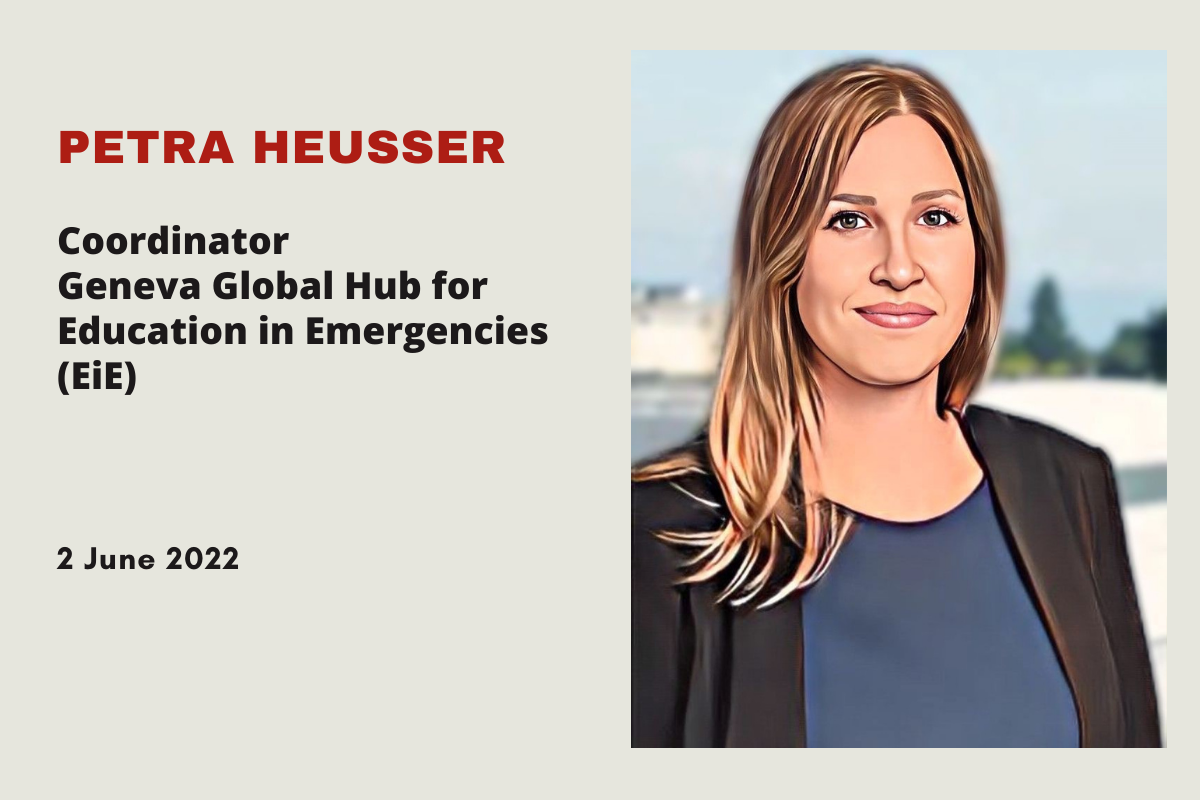The Interview | Petra Heusser
 |
How would you present your organization in a few words? What is your role? What is your goal? |
The Geneva Global Hub for Education in Emergencies is a physical and virtual platform that aims to be a catalyst for joint action among its members, and to increase collaboration with other sectors to prioritise education in emergencies (EiE). Together we work to create change internationally, increase country-level impact, and foster political, financial and operational commitments for EiE. This is to enable that all children and youth affected by humanitarian emergencies, protracted crises, displacement and migration have their right to a quality education fulfilled, respected and protected.
My own role, as the Coordinator of the EiE Hub, is to catalyse strategic collaboration and communication among members and key stakeholders. We have a bold new Strategy for 2022-2025, and my objective is to support the implementation of the three strategic objectives: catalyse joint action, inspire political will and commitment, and boost the impact of education in emergencies’ preparedness and response through improved data, research and evidence.
 |
Among the concentration of actors in Geneva (IOs, NGOs, permanent missions, academia, and the private sector), who do you work with and how? |
The EiE Hub harnesses the expertise and capabilities of International Geneva’s diplomatic, humanitarian, development, human rights, protection, climate, migration, and peace communities and organizations, along with academia and foundations, to come together for transformative joint action for education in emergencies. The core group of partners are the members of the EiE Hub.
With a unique ability to convene its members and other stakeholders that share an interest in EiE, the EiE Hub has the opportunity to bring critical messages into the political forums where they need to be heard, and to mobilize governments. The EiE Hub supports people affected by crisis, including children where appropriate, youth, teachers and other education stakeholders, by putting their priorities and demands before decision-makers to inspire political will to advance EiE. As an independent actor, the EiE Hub takes a broad view and works to ensure that diverse voices are represented to influence policy-making at international and national levels. This makes the EiE Hub a valuable intermediary that can work to ensure that governments and other stakeholders see education as a priority before, during and after emergencies, and in protracted crises, and that they take action as a result.
 |
What are the strengths and weaknesses of Geneva with regards to the development of your activity? |
Geneva, a city that embodies a long humanitarian tradition, is host to key and diverse actors: it is home to the UN’s second headquarters, 38 international organizations, 750 NGOs, the Permanent Missions of 181 UN Member States, and leading academic institutions. Geneva is a unique centre of thought leadership, and has the infrastructure and networks in place to drive the spread of new ideas quickly and collaboratively, and to create new momentum for education in emergencies worldwide.
When it comes to education in emergencies, however, the strengths of International Geneva remain largely untapped, as evidenced by the chronic underfunding and under-prioritization of EiE. The EiE Hub seeks to harness the expertise and capabilities of International Geneva’s diverse communities to engage and influence global and national processes that are relevant to the EiE sector as a whole.
 |
What do you think global governance should look like 20 or 30 years from now? |
Silos between sectors, which have detrimental effects on effectively tackling education in emergencies, must be broken down as much as possible to enhance the coordination of efforts across sectors and across the nexus, which will help leverage political action to favor EiE. Education is a cross-cutting concern, intricately linked with issues of gender, disability inclusion, child protection, health, nutrition, climate and displacement, to name just a few (more information here). There is an urgent need for approaches to all of these issues which emphasize how each of them supports the other - and above all, that reject putting them in competition for resources.
Furthermore, continuity of quality education is key to the transition from a humanitarian emergency to longer-term development. Especially with so many protracted crises in the world today, there is a need for serious thinking about how to ensure that EiE is being delivered in ways that enable children and young people to build towards their long-term future. Education in emergencies can’t just be a band-aid to hold kids over until the crisis passes on - not when the "temporary" crisis might last for years.
 |
What question would you like to have been asked? |
"Why is education so important to emergency response?" Children and youth in crisis situations, along with their caregivers, consistently ask for education as a priority. They see it as the key to a better future. Like young people everywhere, they hunger for safe spaces, learning, a sense of community, and the tools needed to shape a promising future. And beyond their expressed need to go to school, education is their inherent human right, and an acknowledged life-saving intervention in humanitarian emergencies (see Central Emergency Response Fund Life-Saving Criteria).
It is the responsibility of state governments to provide all children and youth under their jurisdiction with quality education. International actors can and should support governments in fulfilling this responsibility. Connecting and coordinating the actors in Geneva and beyond who can and must make a difference in that is one of the key roles of the EiE Hub.
